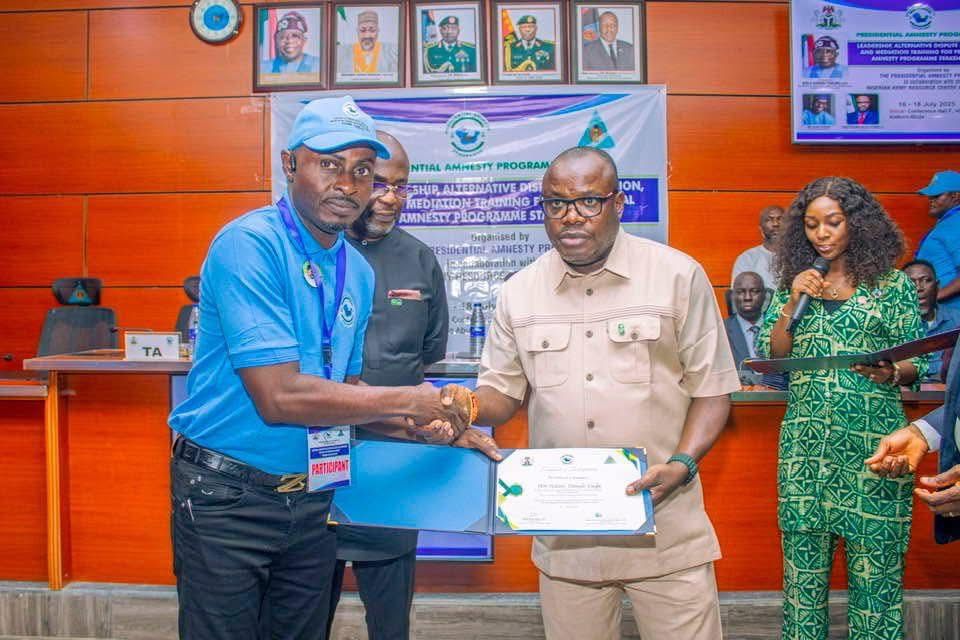Business
Pension Funds Hit N5.4trn

Nigeria’s pension funds has hit nearly N6 trillion with approximately seven million contributors.
The Director-General, National Pension Commission, (PenCom), Mrs Chinelo Anohu-Amazu who disclosed this revealed that the pension funds has put the nation on a high pedestal in terms of worker’s welfare in the continent.
She said that the funds was not below N5.4 trillion with the tendency to appreciate shortly saying it was a good development for the sub-sector which hitherto was comatose.
While speaking on the Role of Regulators in Deepening Capital Market at the 2016 Business Day Capital Market Conference in Abuja she added that Nigeria had the capacity to generate more funds and that the Commission was already on a micro pension project.
The theme of the conference was “Deepening Nigeria’s Capital Market through Maximum Utilisation of Pension Funds.’’
The PenCom DG, who added that pension fund was one of the single largest institutional investments in Nigeria, operates entirely on deductions from workers but that it is imperative for operators of the fund to derive ways of developing products to enhance the yield of the funds.
She said that the challenges faced on investments of pension funds arise from lack of creativity of the operators.
“The PFAs are constrained; they are unable to develop the products they invest which is why we have a preponderance of the pension funds in Federal Government securities, there are no alternatives.
“Part of the thing I want to throw out to operators in this room is to work towards developing alternatives and new products,’’ she said.
The Director-General said the regulators were doing their bit at ensuring that the PFAs were highly regulated.
She said several regulations had been done and what was left was to ensure the official issuance of those regulatory actions in the sector.
“Our eyes are on two things; protecting the funds and making sure that its primary mandate as required by law, which is paying retirement benefit as and when due, is not tampered with.
“That mandate also extends to making sure that the value is not eroded, and it will be our joy that various institutions are deepened by the pension fund and the capital market is just one of those institutions,” she added.
She said the issue of channeling the pension fund to the capital market was welcomed as long as the contributor was assured of the channel the fund was taken to and its safety.
She added that this could be achieved through efficient regulation and prudent management of the fund.
Also speaking at the event, the Managing Director, Nigeria Deposit Insurance Corporation, Alhaji Umaru Ibrahim said one of the major challenges in the sector was the unwillingness of people to invest.
He said, “it is not only about raising the money but finding ways to invest it and we also have to be conscious of the returns and the risk involved in investment.”
The Principal, Bain and Company Nigeria, Mr Jude Uzonwanne said lack of competition at the PFAs was causing “an extreme conservatism in the sector’’.
According to Uzonwanne, regulators should not only face trend but be more effective by focusing on changes that will trigger competition among PFAs.
He said mergers and acquisition should be encouraged as it would make CEOs to sit up and urged that family companies should be taken public to ensure sustainability
Business
Dangote Refinery Boosts Fuel Exports as Gulf Refineries Shut Down

By: Fabian Apechihin
The Dangote Petroleum Refinery has ramped up fuel exports to international markets amid widespread refinery shutdowns in the Middle East, industry sources confirmed.
A senior official at the $20bn Lagos-based plant told The PUNCH that the facility exported significant volumes of petrol (PMS), diesel (AGO), and aviation fuel (Jet A1) to foreign buyers in August, following earlier shipments in June and July.
The surge comes as Saudi Aramco and other regional producers face heavy maintenance schedules, tightening fuel supply. Aramco has already shut down two plants and plans further closures, including its 460,000 b/d Satorp refinery in Jubail for a 60-day turnaround in November–December. Kuwait and India are also scaling back capacity for maintenance and seasonal demand.
According to Argus Media, these shutdowns are pushing Gulf nations to import record volumes of gasoline, with Saudi Arabia and the UAE sharply increasing purchases from Europe and other markets in recent months.
While some reports pointed to operational constraints at Dangote’s 650,000 b/d facility, the company dismissed such claims, insisting production is on track to reach 700,000 b/d by December. Earlier this year, Aliko Dangote announced the refinery had sold two cargoes of jet fuel to Saudi Aramco and recently achieved exports of about 1 million tonnes of petrol between June and July.
“With Gulf refiners offline, Nigeria has now emerged as a net exporter of refined products,” Dangote said.
Analysts suggest the extended refinery outages in the Middle East will further strengthen demand for Dangote’s output, positioning the Nigerian plant as a key supplier in regional fuel markets.
Would you like me to tighten this further into a 5–6 paragraph wire-style news brief, or keep it as a detailed feature-style report with more context on Gulf refinery shutdowns?
Business
US Oil Exports to Nigeria, Others Fall to 3.3m bpd as Local Output Rises

By: Fabian Apechihin
The United States’ crude oil exports to Nigeria and other African countries fell for the fifth consecutive month in July 2025, averaging 3.3 million barrels per day (bpd), the lowest level since March 2022.
The Organisation of Petroleum Exporting Countries (OPEC) disclosed this in its August 2025 Monthly Oil Market Report (MOMR), attributing the decline to weaker flows to Europe and Africa, particularly Nigeria, but without giving further details.
Industry analysts link the slowdown to the ramp-up of local refining capacity, especially the 650,000 bpd Dangote Refinery, which has reduced Nigeria’s reliance on imported crude, including from the US. Vanguard checks also show that crude importation has slowed further in recent months due to improved domestic production.
According to OPEC data, Nigeria’s crude oil output—excluding condensates—rose by 11 per cent year-on-year to 1.559 million bpd in July 2025, up from 1.386 million bpd in the same period of 2024. This marks the country’s highest monthly production level so far this year.
The Nigerian Upstream Petroleum Regulatory Commission (NUPRC) corroborated the figures, stating that overall output, including condensates, exceeded 1.8 million bpd in July.
Gbenga Komolafe, Chief Executive of the NUPRC, said the milestone was achieved through the agency’s “Project 1 MMBOPD Incremental” initiative, supported by a multi-stakeholder collaborative framework.
“We are glad to report that we crossed the 1.8 million bpd mark on peak production last month, with average production hovering at 1.78 million bpd,” Komolafe stated.
He added that the Commission is working to sustain production growth by optimising the Maximum Efficient Rate (MER) framework, improving produced water management, and aligning operational shutdowns and maintenance schedules to minimise disruptions.
“With these measures and continued collaboration, the presidential mandate on production increase is well within reach,” he said.
Do you want me to make this rewrite more concise for a newspaper front-page brief or keep it detailed like a full energy market report?
Business
NDYPC Hails Otuaro’s Reforms in Presidential Amnesty Programme

• Lauds transparency, fairness in beneficiary selection and grassroots empowerment
• Says reforms align with Tinubu’s Renewed Hope Agenda, restore trust in Niger Delta
The Niger Delta Youths for Positive Change (NDYPC) has commended the Administrator of the Presidential Amnesty Programme (PAP), Dr. Dennis Otuaro, for what it described as bold, people-focused reforms that are restoring trust and delivering tangible benefits to the Niger Delta.
In a statement signed and issued by Comrade Elliott Yibakeni, after the conclusion of leadership training sessions with ex-agitator leaders in Abuja, the group said the PAP, once in urgent need of renewal, is now undergoing a transformation that reflects transparency, fairness, and accountability.
“At a time when public trust in institutions was waning, Dr. Otuaro has emerged as a symbol of credibility and transformation,” the statement read. “His visionary leadership is restoring integrity, empowering communities, and driving a sustainable development agenda that resonates with the aspirations of the Niger Delta.”
According to NDYPC, under Otuaro’s leadership, beneficiary selection has become fair and merit-based, ending years of favoritism and political interference. The group added that access to education, skills training, and empowerment opportunities, both locally and abroad, is now guided by equity and open competition.
The group highlighted several internal reforms, including improved staff welfare, strengthened professional capacity, and strict adherence to best practices in public procurement. These, it said, have made the PAP more efficient, responsive, and transparent.
NDYPC also praised Otuaro’s inclusive governance style, noting his sustained engagement with traditional rulers, women leaders, civil society organizations, and local communities. This approach, the group said, has strengthened peace-building efforts and deepened trust between the PAP and the people it serves.
In line with President Bola Ahmed Tinubu’s Renewed Hope Agenda, the PAP has maintained consistent payment of stipends to ex-agitators and extended direct support to vulnerable populations. NDYPC also applauded new healthcare interventions for ex-agitators facing health challenges.
The statement further commended the programme’s investments in scholarships, vocational training, and economic empowerment initiatives aimed at preparing Niger Delta youths for leadership, innovation, and sustainable livelihoods.
“Every decision reflects a deep commitment to public trust, responsible stewardship, and long-term development,” NDYPC stated. “Under Dr. Otuaro’s watch, the Niger Delta is rising stronger, united, and filled with renewed hope.”
-

 Uncategorized5 years ago
Uncategorized5 years agoFG, states urged to harness flooding for ranching, others with technology – Agbaje
-

 Headlines10 years ago
Headlines10 years agoBreaking: EFCC seals Borno House of Assembly, as Hon members take to their heels
-

 News11 years ago
News11 years agoNigeria Security Operatives Stage Manhunt For Homosexual Perpetrator
-

 News9 years ago
News9 years agoHow 21-year-old Girl fled community over accusation of lesbianism
-

 News10 years ago
News10 years agoYobe Gov Moves Against Deputy
-

 Opinion7 years ago
Opinion7 years ago7 signs she has friend zoned you
-
Technology4 years ago
Online job placement company headhunts women
-

 Headlines10 years ago
Headlines10 years agoBorno Dep Gov Abducts Another Church Leader





